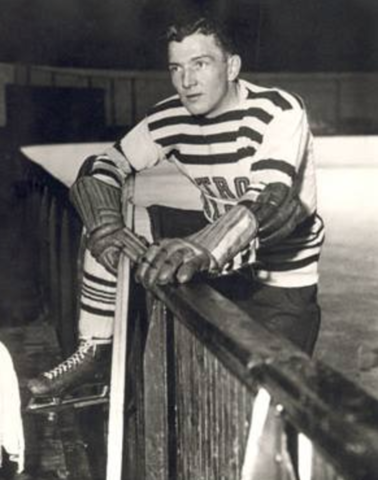IMAGE INFORMATION
EditLawrence Henry "Little Dempsey" Aurie - Born February 8, 1905 in Sudbury, Ontario – Died December 11, 1952 in Detroit, Michigan was a Canadian/American ice Hockey right winger and coach.
- Prince of Wales Trophy Champion 1934, 1936, 1937 with Detroit Red Wings.
- Stanley Cup Champion 1936, 1937* with Detroit Red Wings
Stanley Cup finalist 1934.
*Broken ankle did not play in playoffs.
Aurie grew up playing Hockey in Sudbury, playing his first junior Hockey with the Sudbury Cub Wolves in 1921. Aurie was invited to play with the St. Michael's Majors in 1922, and led the team in scoring with 16 goals in 7 games.
Aurie returned to his hometown of Sudbury in 1923 to play for the senior Sudbury Wolves for 2 seasons, he then joined the Galt Terriers in 1925 for 1 season.
Aurie then signed as a free agent on November 14, 1926 with the London Panthers of the Canadian Professional Hockey League / Can-Pro, starting his professional Hockey career, playing with the Panthers for 1 season.
When Jack Adams first arrived in Detroit as coach, he claimed Aurie from the Panthers in the Inter-League Draft on September 26, 1927, and Aurie would make his debut with the NHL Detroit Cougars on November 15, 1927 vs Pittsburgh Pirates at Duquesne Gardens in a 6-0 Detroit win.
Aurie scored his 1st NHL goal vs Hal Winkler of Boston Bruins at 2:25 of 2nd period on November 19, 1927 at Boston Arena in a 5-2 Bruins win.
Aurie scored his 1st NHL hat-trick vs New York Rangers on January 3, 1928 at Madison Square Garden in a 4-2. Detroit win
Aurie would go through some pretty lean years in Hockeytown. The first three years they were known as the Cougars, the next two they were known as the Detroit Falcons, and finally for the 1932-33 season, they became known as the Detroit Red Wings.
Aurie was one of the few bright spots on those early Detroit teams, and was rewarded by being named captain in 1932. Not coincidentally, the Red Wings success increased under Aurie's captaincy. By 1933-34 Aurie starred on a line with future Hall of Famers Cooney Weiland and Herbie Lewis, his 35 points topped the club in scoring. The Red Wings finished the regular season in first place in their division. They then pulled off one of the biggest upsets in playoff history when they outplayed the Toronto Maple Leafs to advance to the Stanley Cup finals. Once in the finals the were eventually beaten by the Chicago Black Hawks. Aurie led the league in playoff scoring in 1934 with 3 goals and 10 points in nine games.
His dedication to off-season fitness with his short stature (5 foot 6 inches) earned him the nicknames "Little Dempsey" after the heavyweight boxing champion Jack Dempsey, as Aurie was a fiesty, scrappy right winger who played with full out heart and desire, and "The Little Rag Man" (for his remarkable and entertaining ability to control or "rag" the puck during penalty killing).
Aurie and Herbie Lewis represented the Red Wings at the first ever NHL All Star Game in 1934, the Ace Bailey Benefit Game
The Red Wings took a step back in 1934-35 when they missed the playoffs, but made moves to rectify that by trading Weiland to the Boston Bruins for Marty Barry. Barry assumed Weiland's pivot spot between Lewis and Aurie and the trio led the Red Wings to their first Stanley Cup championship in 1936.
The next season, Aurie scored his NHL leading 23rd goal on March 11, 1937 in a 4–2 win over the New York Rangers, but later in the game fractured his ankle in a collision with Rangers' defenceman Art Coulter, ending his season. Aurie's season leading scoring performance earned him a berth on the NHL First All-Star Team. However the season was bittersweet as the broken ankle late in the season kept Aurie out of the playoffs. Despite missing Aurie, the Red Wings repeated at Stanley Cup champions.
The lingering effects of his fractured ankle began to affect his play and in 1937–38, he dropped to 10 goals and 19 points and was forced to retire after the season at age 33.
The following season, Aurie was named player-coach of Detroit's AHL farm club, the Pittsburgh Hornets, but returned to the Red Wings for one final game on Jan. 10, 1939 - scoring the winning goal against the Montreal Canadiens in a 3–0 shutout at Detroit.
Aurie coached the Hornets from 1938 to 1944, and played 95 games for them over 4 seasons as player/coach, helping them to the 1940 Calder Cup finals.
Aurie was also selected to the - IAHL Second All-Star Team in 1939.
Aurie played in 489 regular season NHL games, scoring 147 goals (26 GWG / 2 OTG), 128 assists with 283 penalty minutes and 24 NHL playoff games, scoring 6 goals (1 GWG), 9 assists with 10 penalty minutes.
Aurie, a fearless and talented right winger, played for Detroit from 1927 through 1939. Through his tireless, selfless play, he thoroughly impressed then-owner James Norris. In fact, Norris’ admiration of Aurie motivated him to retire Aurie’s jersey No. 6 in 1938. Aurie became the first-ever Red Wing to be honored in this manner
However, Norris did not hang any Aurie banner in the rafters at Olympia Stadium – it was not his custom. In the 1960’s, he did authorize a display of Aurie’s jersey in the lobby at Olympia Stadium. The display, which also included a photo and plaque describing Aurie’s career, was eventually removed from the lobby, and the jersey was thought to be the one later shipped to Toronto and the one currently on display at the Hockey Hall of Fame.















